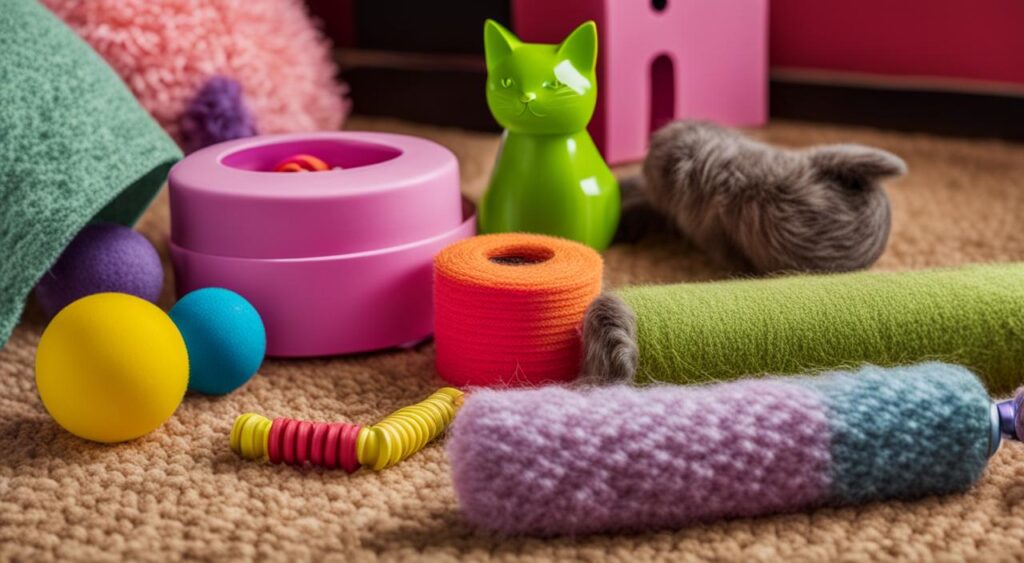As pet owners, we love our furry companions and want the best for them. In this article, we will provide expert tips and advice on how to care for your cat. It’s important to understand the basic needs of your cat to ensure a happy and healthy life.
One of the key aspects of cat care is their health. Regular check-ups with your veterinarian will help you catch any health problems early on. Understanding the nutritional needs of your cat is also important for maintaining their health and preventing common health issues.
Another important factor to consider is your cat’s behavior. Cats have unique personalities and behaviors, so understanding your cat’s individual needs can help you provide the best care possible.
Whether you’re a first-time cat owner or an experienced one, there’s always room to learn more about cat care. So let’s dive in and discover how to ensure your cat leads a happy and healthy life.
Key Takeaways:
- Regular check-ups with a veterinarian are important for your cat’s health.
- Understanding your cat’s behavior can help you provide better care.
- Choosing the right nutrition for your cat can prevent common health issues.
- Providing proper care, nutrition, and understanding of behavior contribute to a happy and healthy cat.
- Learning about the unique needs of your cat breed can help you provide suitable care.
Understanding Your Cat’s Needs
Understanding your cat’s behavior is crucial to providing adequate care. Domestic cats are unique creatures with standardized behaviors, but each breed has its own specific traits and requirements. Consider the following pointers to learn more about cat behavior and how to choose the right breed for you:
- Cat behavior: Cats are known to be independent, curious, and playful creatures. They often communicate through body language, with tail movements indicating mood changes. Taking the time to learn their language allows you to anticipate their needs and respond accordingly.
- Domestic cat: Most domestic cats share similar characteristics, such as grooming, hunting, and sleeping habits. Providing environmental enrichment through toys, scratching posts, and interaction with humans also benefits their well-being.
Breed Characteristics
Different cat breeds have distinct personalities, appearances, and health concerns. Knowing these differences can help you find the right match for your lifestyle:
| Breed | Personality | Appearance | Health Concerns |
|---|---|---|---|
| Siamese | Active, vocal, intelligent | Slender, pointed ears, blue eyes | Respiratory issues, dental problems, obesity |
| Persian | Calm, affectionate, quiet | Fluffy coat, flat face, round eyes | Breathing difficulties, eye infections, kidney disease |
| Maine Coon | Gentle, friendly, adaptable | Large, long-haired, fluffy tail | Heart disease, hip dysplasia, dental problems |
| Bengal | Energetic, curious, social | Spotted coat, muscular build | Urinary tract problems, heart disease, cataracts |
By understanding your cat’s behavior and choosing the right breed for your lifestyle, you can form a strong bond with your feline friend based on mutual understanding and respect.
Essential Cat Care Tips
Here are some essential cat care tips to ensure your feline friend’s well-being:
Creating a Stimulating Environment
Indoor cats require a stimulating environment to prevent boredom and destructive behavior. Provide your cat with scratching posts, cozy beds, and perch areas for optimal comfort. Consider investing in a cat tree or a window perch to give your cat a chance to observe the outside world.

Choosing Appropriate Toys for Play
Playing is a crucial part of a cat’s physical and mental health. Select toys that encourage exercise and mimic hunting behaviors. Cats enjoy chasing toys such as balls, wands, and feathers. Be sure to rotate your cat’s toys regularly to keep them engaged and entertained.
Ensuring Physical and Mental Well-being
Cats require regular exercise to maintain a healthy weight and prevent health issues. Encourage your cat to play and engage in physical activity. Keep your cat’s vaccinations up to date, and schedule regular check-ups with your veterinarian.
“Cats are incredibly resilient creatures, but they still need our care and attention to thrive.” – Jackson Galaxy
Nutrition and Health for Your Cat
Proper nutrition is critical in ensuring the overall health and well-being of your cat. Feeding your furry friend a balanced diet that meets their nutritional requirements can enhance their immune system, energy levels, and digestion, among other benefits. In this section, we will provide vital information on how to choose the right food and ensure your cat is healthy and well-nourished.
Cat Nutrition 101
Understanding your cat’s nutrition is vital in choosing the right food. Your feline friend requires a diet that is high in protein and fat and low in carbohydrates. Look for cat food that contains high-quality and digestible protein sources such as chicken, beef, lamb, or fish. Avoid cat food that contains artificial preservatives, fillers, and additives, which may cause health problems for your pet.
Choosing the Right Cat Food
When choosing cat food for your pet, it’s essential to look for brands that meet the Association of American Feed Control Officials (AAFCO) standards. These standards ensure that your cat’s food contains all the nutrients they need to stay healthy. Look for cat food that is appropriate for your cat’s age, weight, and health condition. If you’re unsure about what to feed your cat, consult with your veterinarian.
Common Cat Health Issues
| Health Issue | Symptoms | Treatment |
|---|---|---|
| Obesity | Weight gain, lethargy, lameness | Weight loss program, exercise, controlled feeding |
| Urinary Tract Infections | Frequent urination, blood in urine, crying while urinating | Antibiotics, dietary modifications |
| Dental Problems | Bad breath, swollen gums, difficulty chewing | Dental cleanings, extractions, and routine check-ups |

Conclusion
As a responsible cat owner, it is important to provide your feline friend with the best care possible. By understanding their needs, you can ensure they lead a happy and healthy life. Remember to pay attention to their behavior, choose the right breed, provide stimulating environments, and properly feed them.
Regular vet check-ups and prompt attention to any health issues are crucial to your cat’s well-being. Remember, cats cannot communicate their discomfort, so it is important to observe any changes in behavior or appetite.
Lastly, make sure to spend quality time with your cat, engaging them in play and showing them love and affection. A well-cared-for cat will bring you years of joy and companionship.
FAQ
How often should I take my cat to the vet for check-ups?
It is recommended to take your cat for a check-up at least once a year. Regular veterinary exams are important to monitor your cat’s health, update vaccinations, and detect any potential health issues early.
What are some common cat behavior problems and how can I address them?
Common cat behavior problems include scratching furniture, litter box issues, and aggression. To address scratching, provide appropriate scratching posts and redirect them from furniture. For litter box problems, ensure it is clean and accessible. Aggression may require professional behavior guidance.
What should I feed my cat and how often?
Cats require a balanced diet that includes high-quality cat food. Consult with your veterinarian to determine the appropriate type and amount of food for your cat. Generally, cats should be fed 2-3 small meals per day.
How can I keep my cat entertained and mentally stimulated?
Provide a variety of cat toys to keep your cat entertained. Interactive toys and puzzle feeders can help stimulate their mind. Consider setting up a cat-friendly environment with scratching posts, perches, and hiding spots.
How can I introduce my new kitten to my existing cat?
Gradually introduce the new kitten to your existing cat by keeping them separated at first. Allow them to smell each other’s scent and gradually increase supervised interaction. Provide multiple resources, such as food bowls and litter boxes, to avoid territorial conflicts.
How can I prevent common health issues in cats?
Regular veterinary care, proper nutrition, maintaining a clean environment, and providing plenty of fresh water can help prevent common health issues in cats. Keep an eye out for signs of illness and seek veterinary advice if you notice any unusual symptoms.




